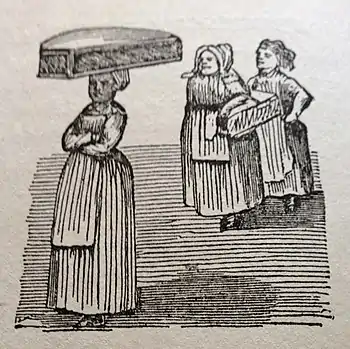
WASHERWOMEN[1]
The washerwoman is a creature of which there are various species.
There is the washerwoman who works very cheap; but who never gives you back your own socks or undershirts; and the exchange is invariably to your disadvantage.
There is the washerwoman who makes it a rule of life to wash off all the buttons of your shirts and pull all the strings off your drawers and never dreams of putting them on again. This washerwoman charges like sixty.
There is the washerwoman who puts the thinnest kind of starch in your shirts, so that they become limp rags after being worn an hour. This kind of washerwoman gets rich fast. She has an eye to business.
Then there is the washerwoman who promises to bring your clothes at a certain hour, and never does so under any possible circumstance.
But there is also the good, honest, industrious, prompt, and motherly or sisterly washerwoman who puts buttons on your shirts and darns up your socks and does not charge extra therefor.
We looked for such a washerwoman for two years before we found her. Now we wouldn't give her up for a small fortune. If washerwomen have their faults, it must be remembered they have their trials and afflictions. Many of them have been spoiled by bad treatment.
There is no sort of thieving so contemptible as to beat one's washerwoman; but we doubt if any other class of working-people are so much victimized.
It is pretty rough to labor hard all the week, working until one is ready to drop down with fatigue; obliged to watch changes of weather; obliged sometimes when a clothes-line breaks to do all the work over again; obliged to furnish one's own soap and starch and blueing; —
And then to carry the work to those who ordered it, — all nice and clean and pretty, — expecting to receive the just reward of one's labor; —
But, on the contrary, to receive nothing but lying promises and sometimes even hard words; — And then to go home hungry; and to sit down and cry because there is not a cent in the house!
No wonder the poor women often say it is better to be a sieve than a washerwoman.
No wonder that washerwomen should sometimes feel disgusted with their work, and cease all effort to try and please, and tear off buttons and pull off drawer strings with rage and fury.
It isn't their fault if they are not always angels.
- ↑ Item, August 31, 1880.